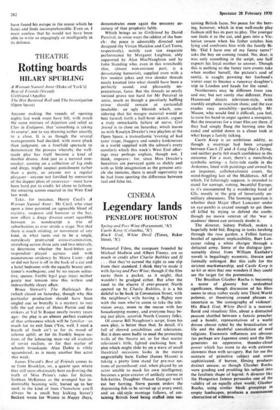THEATRE
Rotting boards
HILARY SPURLING
A Woman Named Anne (Duke of York's) Best of Friends (Strand) Girlfriend (Apollo) The Hot Buttered Roll and The Investigation (Open Space) Anyone making the rounds of opening nights last week must have felt, with much the same mixture of dejection and relief as Cloy in Endgame, that 'something is taking its course', not to say drawing rather smartly to a close. It is as though the several managements had decided, with more pluck than judgment, on a fourfold spectacle to demonstrate the process whereby the well- made play has itself become a kind of dustbin drama. And just as a teetotal non- smoker, coming on a collection of fag ends and dregs, might suspect punishment rather than a party, so anyone not a regular playgoer—anyone not fortified by memories of the dapper plots of yesteryear—must have been hard put to credit, let alone to fathom, the amazing scenes enacted in the West End last week.
Take, for instance, Henry Cecil's A Woman Named Anne: Mr Cecil, who once upon a time patented an agreeable blend of mystery, suspense and humour at the bar, now offers a dingy divorce court squabble between as nondescript a trio of suburbanites as ever strode a stage. Not that there is much striding, or movement of any kind, in what turns out to be a single, mercilessly protracted cross-examination, stretching across three acts and two intervals, to determine whether the hard-bitten co- respondent—played agilato and with monotonous stridency by Moira Lister—did or did not have it off in the back of a car and a hotel bedroom with the equally brassy peti- tioner's woebegone, and by no means seduc- tive, spouse. Feeble legal gags inject neither gaiety nor tension into this witless and indescribably sleazy affair.
Bruce Stewart's The Hallelujah Boy (which closed on Saturday, though why this particular production should have been singled out so brutally is a mystery to me) tells the sad story of Henri Perrin and the strikers at Val St Roque nearly twenty years ago: the play is an almost perfect example of that artlessness which will be familiar—as much for its exit lines (`Yes, well, I need a breath of fresh air') as for its mood of solemn uplift, or for its frankly bogus no- tions of the labouring man—to all students of soviet realiirn, 'or for that matter of schools broadcasts. Alan Dobie is vilely squandered, as is many another fine actor this week.
James Elward's Best of Friends comes to us from Brooklyn, NY, a quaint spot where they still seem obstinately bent on froving the truth of Miss Prism's rules for fiction. Siobhan McKenna as the wronged but in- domitably beaming wife, buried up to her neck in the kind of lines ('Somehow you'll always be a small boy kicking leaves') Beckett wrote for Winnie in Happy Days,
demonstrates once again the uncanny ac- curacy of that prophetic fable.
Which brings us to Girlfriend by David Percival, in some ways the oddest of the bun- ch: the piece is admirably directed and designed (by Vivian Matalon and Carl Toms, respectively), nattily cast (an exquisite performance by Margaret Leighton, ably supported by Alan MacNaughton and by John Standing who, even in this wretchedly slim, almost non-existent part, is a devastating humorist), supplied even with a few modest jokes and two slender threads nicely knotted into what should have been a perfectly sound, and pleasantly un- pretentious, farce. But the threads so neatly twisted prove too hard for Mr Percival to untie, much as though a peculiarly baffling crime should remain at curtainfall insoluble: an ugly blemish which, con- sidering that his meagre material would at best furnish forth a half-hour sketch, argues a truly remarkable failure of nerve. Girl friend is to close on Saturday, which leaves us with Rosalyn Drexler's two playlets at the Open Space, a transatlantic 'evening of bad taste' (rape, thuggery and sundry kinkinesses in a world supplied with the adman's every comfort) which this week's West End offer- ings may perhaps explain, though not, I think, improve: for, since Miss Drexler's banalities are purveyed quite as slickly and with as little imagination as the genuine arti- cle she imitates, there is small superiority to be had from spotting the difference between real and false tat.


































 Previous page
Previous page